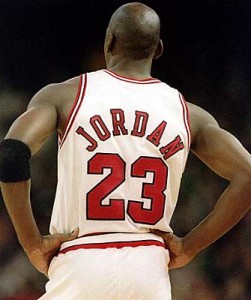 No, that most definitely isn’t a rhetorical title. I have been gently prodded into seriously thinking about that question. A reader wrote a thoughtful “comment” to my Saturday post essentially taking the stance that talent is nonsense and has little or nothing to do with success. (By the way, I put “comment” in quotations because the response was two-thousand two-hundred and twelve words long—no, I am not kidding; and in the writer’s defense, she more than admitted and apologized for the incredible length.)
No, that most definitely isn’t a rhetorical title. I have been gently prodded into seriously thinking about that question. A reader wrote a thoughtful “comment” to my Saturday post essentially taking the stance that talent is nonsense and has little or nothing to do with success. (By the way, I put “comment” in quotations because the response was two-thousand two-hundred and twelve words long—no, I am not kidding; and in the writer’s defense, she more than admitted and apologized for the incredible length.)
I have to say I was at first stunned by her suggestion. I’m still stunned, actually, that she would honestly believe such a thing is true. That’s why I pondered the question so deeply. First and foremost the writer was respectful, courteous, thoughtful, and completely intelligible. In other words she may have taken two thousand words to do it, but she respected the only rule I have on this blog, and that is that we have CIVIL discourse. No personal comments, no attacks, no non sequitur diversions or tired claims of “strawman arguments”. Nope, she was perfectly civil.
And a total lunatic.
KIDDING!!!!
I couldn’t resist. Yes, I have that sense of humor. What’s the Barenaked Ladies lyric?
“I’m the kind of guy who laughs at a funeral.“
Not really, but I’ve always taken that to mean something a little less egregious than it sounds. I find humor helps with all thing and that a good laugh is worth more than a thousand pats on the back.
But back to the question at hand: does talent even exist and does it play a role in the success of an individual (ultimately, in our case, a writer)?
 First let’s agree on a definition of talent. The dictionary definitions (from Dictionary.com):
First let’s agree on a definition of talent. The dictionary definitions (from Dictionary.com):
1. a special natural ability or aptitude.
2. a capacity for achievement or success; ability.
Hmm. The first I expected. Kind of the standard (even boring) definition. But could #2 BE any more germane to this discussion? I almost feel like I could stop trying to make my point now. I mean that’s IT. The answer.
But I still want to look at the idea of talent existing or not existing as it relates to another key point my writer friend implied:
That a lot of practice and hard work essentially negates “talent” (if it even exists at all). The idea being that any person can write a great novel if they spend enough time learning, practicing the craft, taking in a lot of constructive critiques, etc.
 Before I go on I want to make one thing totally clear: I OF COURSE believe that hard work, dedication to craft, honing, reworking, listening in-depth to criticism, etc. are crucial to improving at any activity or profession (writing being no exception). In other words, we’re not talking about whether one improves with a ton of hard work; we’re talking about whether any person can be Michael Jordan or (insert your favorite author—I’m not inviting THAT debate) as long as they take enough time to practice. (BTW, the commenter brought up Michael Jordan, not me.)
Before I go on I want to make one thing totally clear: I OF COURSE believe that hard work, dedication to craft, honing, reworking, listening in-depth to criticism, etc. are crucial to improving at any activity or profession (writing being no exception). In other words, we’re not talking about whether one improves with a ton of hard work; we’re talking about whether any person can be Michael Jordan or (insert your favorite author—I’m not inviting THAT debate) as long as they take enough time to practice. (BTW, the commenter brought up Michael Jordan, not me.)
I played competitive sports from elementary school into college, and my son played competitive travel ice hockey from the age of 10 until, well, now (he’s playing Junior Tier III up north). Point is, I can speak fluently about talent, inherent ability (or lack thereof), hard work, practice, good (and bad) coaching, and the rest of the gamut and how it all affects the various level of the athlete (or non-athlete).
I’ll sum it up simply: some people have athletic talent and some don’t. A lot of people (like me) have a fair amount—more than the average, let’s call it—but not enough to ever reach the ELITE or professional level no matter how hard they practice or devote themselves to the effort. I’ve never seen one sport season (my own, my son’s, or any of the hundreds of college and professional level I’ve watched) where the worst player on the team became the best (or as good as the best). In fact, based on the theory that talent either doesn’t exist or that hard work negates it, we should really never see much difference in skill level between players at all, should we?
 Trust me, at the competitive sports level (including, I’m afraid, the 10 year-old level) there are no “free rides”. Every kid, every player, every age and position is expected to (and normally does) give 100% throughout every practice, 2-3 hours at a time, 5-6 days a week, every week of the season. So with all that hard work, why aren’t all the players scoring 40 points a game like Michael Jordan? How did Wayne Gretzky so outdistance every other record-holder that in comparison even Michael Jordan would have had to double his career points-per-game average to compare?
Trust me, at the competitive sports level (including, I’m afraid, the 10 year-old level) there are no “free rides”. Every kid, every player, every age and position is expected to (and normally does) give 100% throughout every practice, 2-3 hours at a time, 5-6 days a week, every week of the season. So with all that hard work, why aren’t all the players scoring 40 points a game like Michael Jordan? How did Wayne Gretzky so outdistance every other record-holder that in comparison even Michael Jordan would have had to double his career points-per-game average to compare?
Okay, let’s bring the discussion back into the arts. I’ve talked before in my blog about my early days as a comic book creator. At 8-10 years old my best friend and I decided to stop doodling and start actually drawing for real. We wanted to make our own comic books. Now I was always one of those kids who could draw better than the average schmoe (i.e. I was more than a number of steps above “stick characters”). My friend however—WOW. Even at eight years old I could see his innate ability. The effortless congruity of his lines; the life in his characters’ faces! I mean I could create face—my friend breathed life into it with the stroke of his pencil. Even then it was something to behold. He had IT.
Does talent exist? Yes, it absolutely does. There aren’t many things I am adamant about but this is one of them. Talent exists and it makes one heck of a difference. But here is the key, I think: talent exists at a multitude of different levels and hard work DOES absolutely make one better at whatever their chosen endeavor.
 And not every basketball player needs to be Michael Jordan. Not every writer needs to win the Pulitzer. I’ve never once in my life said or implied that every writer needs to be perfect, the best, or even great—just that they should have enough self-awareness to set current goals at attainable levels and move on from there, never giving up the dream.
And not every basketball player needs to be Michael Jordan. Not every writer needs to win the Pulitzer. I’ve never once in my life said or implied that every writer needs to be perfect, the best, or even great—just that they should have enough self-awareness to set current goals at attainable levels and move on from there, never giving up the dream.
If a person is fulfilled by writing, they should WRITE. And hard work will most definitely improve that writer’s work. A lot. I only suggest that a writer wait until the point where their writing has reached a level of quality where it is worth putting a price tag on it before said writer starts pushing their goods out the door of of the studio and into the real world marketplace.
Who makes that decision (i.e. when the writing has reached that point of quality)? Currently, the writer does. Again, I’m not suggesting the writing must be great (or by whose standards we judge it). Only that it at least have been crafted, honed, practiced, rewritten, edited, critiqued a few dozen times, etc. There is a process and that process is not:
1. Write something.
2. Publish it.
That’s really all I’m saying.
Oh, right…also “talent exists”.
And matters.
~~~~~~~~~~~~~~~~~~~~~~~~~~~~~~~~~~
The blank page is dead…long live the blank page.
~~~~~~~~~~~~~~~~~~~~~~~~~~~~~~~~~~
 Author known to use spontaneous satire, sarcasm, and unannounced injections of pith or witticisms which may not be suitable for humorless or otherwise jest-challenged individuals. (Witticisms not guaranteed to be witty, funny, comical, hilarious, clever, scintillating, whimsical, wise, endearing, keen, savvy, sagacious, penetrating, fanciful, or otherwise enjoyable. The Surgeon General has determined through laboratory testing that sarcasm can be dangerous, even in small amounts, and should not be ingested by those who are serious, somber, pensive, weighty, funereal, unsmiling, poker-faced, sober, or pregnant.)
Author known to use spontaneous satire, sarcasm, and unannounced injections of pith or witticisms which may not be suitable for humorless or otherwise jest-challenged individuals. (Witticisms not guaranteed to be witty, funny, comical, hilarious, clever, scintillating, whimsical, wise, endearing, keen, savvy, sagacious, penetrating, fanciful, or otherwise enjoyable. The Surgeon General has determined through laboratory testing that sarcasm can be dangerous, even in small amounts, and should not be ingested by those who are serious, somber, pensive, weighty, funereal, unsmiling, poker-faced, sober, or pregnant.)



Some people have it and some don’t. It’s as simple as that. “Having it” isn’t necessary better. Indeed, talent has driven many people to abuse drink and drugs, or led them to early graves. And, it can be hell on relationships of all kinds.
You won’t find talent in schools. Indeed, as someone (I think Twain) once said, schools are places where they teach people to imitate genius (talent). Just look at all the great artists, performers, writers, etc. who have emerged from the most unlikely places and how few of them were school-trained. Sure talented people can go to school (and we only pray that school won’t drive the talent out of them).
Talent arrives in raw form. It can only be developed through practice. Constant practice and lots of it.
At least, that’s my opinion.
I’ve often said that talent is an inclination toward something. Thus we then can more naturally apply our focus, and that application of focus is what brings about the results. Said simply, when I went sheep farming(without ever having touched a sheep), my partner and I ate, drank, slept, talked, dreamed sheep and whatever talent we had as livestock breeders, we produced a world Grand Champion ram. That was focus applied. Martina Navratilova was an interesting example of talent in that she then challenged herself to work at her sport like a less talented person might, to see just how good she could get. Gretzky started at 3 years of age in his back yard skating on a little circle of ice his Dad made for him. He started playing hockey then. But the most fascinating thing to me is sitting down with a book by a talented author and trying to figure out how they just did to you what they did. There are some things we’ll never explain, but it’s wonderful to be in their midst.
I believe everybody has some sort of unique talent; some of them figure out in life what it is and they develop it by working hard to improve it. It’s just like getting your dream stereo system for your HDTV: once you get it, you want to make sure it looks as beautiful as possible all the time and never have to change to something different. Well technically, a stereo system is tangible and your talent isn’t, but just bear with the comparison. Hopefully, though, if you do get your dream stereo system, don’t ever let anyone tell you it’s a worthless piece of crap.
Real talent exists. Exceptional talent is cultivated.
Amen Caleb…Amen Rob!
My Mother-in-Law constantly told me throughout our 30 years of knowing each other, “I wish I had as much talent in my whole body that you have in your little finger.” My response ~ “You had the talent to create and raise my husband, I only hope I have as much talent in my whole body that you have in your little finger.”
Passion laced with reality = Talent
What Caleb said.
You might need to have talent to write a book but you need luck to get it published. At that point you can have all the talent in the world and someone will still stare you in the face and say no.
So I guess I agree that talent exists, but we have a funny way of recognizing the people with it . . . as in, half the time we wait until they’re dead.
Perhaps the best point made so far! Sure it exists, but just how far can it get you, right? Thanks for the great comment. 🙂
In answer to how far talent can get you, I believe success is 1% talent, 99% hard work.
Thanks for a thought provoking blog. : )
Hi Rob
I would add passion. While talent points us in one direction, learning and applying what we’ve learned defines our gifts, without passion we may walk away never to realize what we really have. Great post.
Nancy
Yes, people have it, but a talented man who does little with it will lose out to someone with no talent who tries their hardest, I think. A talent is just a good head start in learning a particular skill.
I think talent is like a difficulty setting in a video game. For example one person plays a game on easy while the other plays it in medium. They both have the chance to beat the game and earn achievements its just that it was easier for the other guy thats all. They both can excel and become good at it 🙂
I agree with Caleb. Awhile back there was a Nike commercial with the great MJ and he said and I loosely quote “If anybody thinks I got where I am on talent and did not work my ass off is sadly mistaken” I think that about sums it up. At a young age I was able to draw. I cultivated that ‘talent’ somewhat and to this day can’t draw any better than where I stopped cultivating it. Great Post!
Mr. Rob,
I find it really interesting that your main argument to the question: “Does Talent Exist?” is “Yes it does, I know it”. I came here looking for a possible argumentation to the question, but as I can see, you apparently have some great knowledge that we, mortals, don’t have. According to you “some people will not achieve the professional level no matter how hard they work.”… and the reason for this as you explained is: …because Rob said so. Okay but…I am skeptical Rob, I need a little more science to this – This is where you blew my mind with something I never thought was possible: When you were younger, you drew better than the average but you had a friend who was even better than you… this is exactly when you convinced me that talent exists. But then, I read this article: Talent and its development: An emergenic and epigenetic model. – Keith Simonton [1999], which argues (with just a little bit more arguments) that the notion of talent is possibly a third degree variable when it comes to the achievement of success – at the opposite, environmental factors and the number of hours spent devoted to the acquisition of the skill may be actually the MAIN factor for high level success achievement. I suggest everyone who wants to study the question to read it… and Mr. Rob if you have a few minutes to give to this new religion that we call “science”, I think it could add some salt and pepper to your plate. I also think it would be awesome if we may see the original arguments from that woman that triggered this blog page. Finally, I hope you don’t take my answer as a personal attack, because like you, I like a little of sarcasm and I do not like straw man arguments. 😉
KZ
University of Toronto
Fair enough points, but I don’t feel like your sports example is any good. That is because in sports, more than in any other field, genetics play a huge role in determining success. If your genes don’t give you a strong or fast enough body, you’ve pretty much already lost to those who have the better genes, and there’s nothing you can do about it.
But the fact that this predetermined thing exists in sports does not prove “talent” exists in other fields. Is there a gene that controls creativity? I don’t know, but I doubt it.
Thanks for the response, Titus. 🙂 Really don’t know where to begin on this one. Speed and athletics are apples and orange for one thing—yes, both fruit, but two entirely different concepts. I have three Aussies; two are so athletic they’d blow your mind while the third has not a lick of athleticism but if he gets separation from the other two, his difference in speed is so overwhelming they’ll never lay a paw on him—it completely negates the total athletic dominance they possess.
And you’re whole argument seems to have a basis on genes affecting the physical (speed, athleticism) rather than everything from eye color, propensity or (or against) disease, intellect, visual versus numerical stimulation, creativity—my sister inherited my father’s innate ability to play instruments and sing, play, and chew gum at the same time, whilst the rest of us did not. My mother and I were always more alike creatively and both of her two sisters are published authors (plus she herself wrote amazingly and beautifully with almost no effort). What is “talent if not an innate ability to perform some act or way of thinking naturally here theirs cannot, regardless of practice?
Creativity, intelligence, problem-solving abilities, or any other of a thousand non-physical traits are passed along genetically, not simply physical attributes or abilities.
I am not impressed. The whole question of whether special genetic giftedness is necessary to reach exceptional levels of skill and performance is undecided. There are arguments on both sides. It is far from clear what the truth is. But the idea of special talent has been around for a long time and is entrenched in popular belief. It is not a belief that most of those holding it want to give up. In fact they react very defensively to the suggestion that perhaps some extra, well-targetted work, can make up for being short-changed genetically … or that perfectly average individuals can, through enough of the right sort of work, become world-class.
You may or may not be right, we do not know, but in no way do your “arguments”, weak as they are (“I just know it, and it is obvious from my own and my son’s experience in competitive sport, and that given identical training some excel and others don’t) support your belief.
There is so much wrong here I hardly know where to start. Firstly private conviction is no argument at all. The only person a religious conversion convinces is th one that experiences it. Secondly if only a few examples are considered it is both cherry-picking (failure to look for counter-examples) and statistically insignificant. Thirdly it is to be expected that if a bunch of different people, bringing different genetics, different prior experience, and different levels of intensity do identical training it will benefit some more than others. And that is not even taking into account that the more committed will spend more time outside opf formal sessions honing their skills and thinking about their passion. What is really needed, to see if talent is necdessary is customised training, designed for each individual./ If someone is lacking in a necesary quality that the “talented” individual already has, then the training has to develop the missing quality.
You congratulated your respondent on not setting up a straw man argument … but then you set up a straw man version of the “talent is un-necessary”.
No-one denies that individuals differ genetically. But it is far from clear that lackm of inborn talent prevents them from reaching exceptional levels of skill and performance, or iof iot does, only in certain pusuits … where things like size and p[hysique count for as much as acquired skill and knowledge.
Sorry about the typos. There is no “edit” option.